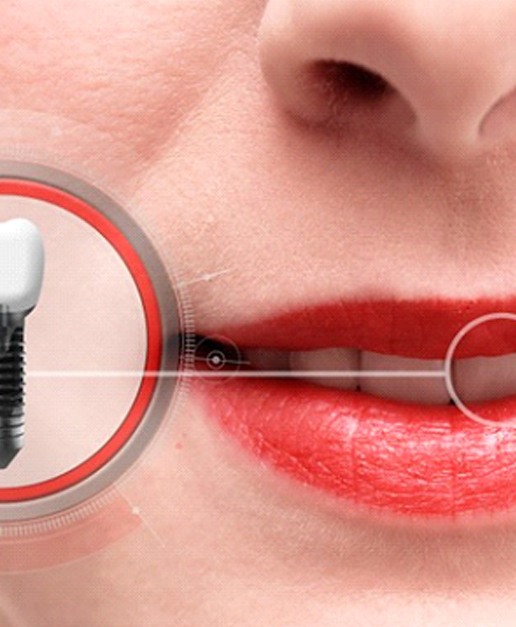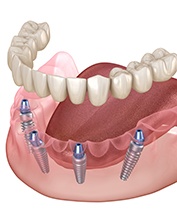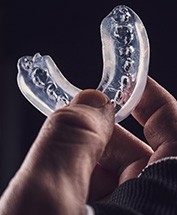Dental Implants – Newport, RI
The Closest Alternative to Your Natural Teeth
Our team understands just how big of an impact losing teeth can have on your life, even if it’s just a single tooth. We use the latest techniques in the dental field to be able to revive your smile to look and feel natural. Dental implants from our Newport, RI dentist are a highly successful treatment that restores the entire structure of any number of missing teeth, including the roots. This allows them to look and feel completely natural. To learn whether you’re a good candidate for this procedure, we invite you to schedule a consultation with us today!
Why Choose Newport Dental Associates for Dental Implants?
- Prevent Jawbone Deterioration
- Dental Implants Last 30+ Years
- Experienced & Skilled Dentist
What is a Dental Implant?

A dental implant is a small, titanium post that is surgically placed below your gumline and into your jawbone to restore the root structure of your missing tooth. Due to its biocompatible nature, it’s able to chemically fuse with the bone to provide a strong, stable, and lasting foundation for your restoration to be secured to. Atop the implant will be placed a metal connector piece that will hold your crown, bridge, or denture in place.
Benefits of Dental Implants

As the most comprehensive and lifelike tooth replacement currently available, dental implants are the closest alternative to your natural teeth. They’re practically indistinguishable from the teeth you were born with in terms of looks, feel, and function. Compared to traditional dental bridges and dentures, there are multiple unique benefits you’ll enjoy by choosing dental implants.
Day-to-Day Benefits

- The restorations that we place on top of your implants are customized to mimic your original pearly whites, ensuring a flawless appearance. Additionally, your implants will feel natural because they’re firmly embedded in your jaw.
- While regular dentures notoriously slip around and fall out, dental implants are just as secure as natural teeth. Not only will you be able to flash your grin with complete confidence, but you can also dig into your favorite crunchy and chewy foods.
- With dental implants, your daily oral care routine shouldn’t be all that different from what it was when you still had all of your natural teeth. You won’t have to spend time taking your prosthetic out of your mouth, cleaning it, and letting it soak overnight. Instead, all you need to do is brush and floss exactly as you did before tooth loss.
Health Benefits

- People who wear dentures often struggle to get all of the nutrients they need, as fresh fruits and vegetables can be hard to chew. That’s not an issue with dental implants. It should be a snap to eat a balanced diet and maintain great overall health.
- Implants are actually the more conservative option compared to dental bridges, which require the permanent removal of enamel from two of your remaining teeth. We don’t need to modify any of your existing tooth structure to place implants, as they can support themselves.
- When you lose a tooth, your jawbone also loses the stimulation that the tooth’s roots gave it through the forces of biting and chewing. Over time, your jawbone could deteriorate to the point where your remaining teeth lose support, increasing the risk of those teeth falling out. Dental implants are the only tooth replacement that bring back the roots of your teeth, keeping your jawbone strong and healthy.
Long-Term Benefits

- By preventing jawbone loss, dental implants not only improve your oral health, but they also help you stay looking young for years to come. A weakened jawbone cannot adequately support your facial muscles, resulting in that sunken-in, wrinkled facial appearance that many denture wearers have. With dental implants, you’ll maintain a youthful glow!
- Once your implants have finished integrating with your jawbone, you can expect them to last for a remarkably long time. In fact, more than 95% of dental implant patients still have their new teeth after more than 10 years, and with the right care, your implants could potentially last a lifetime!
- Since dental implants can last several times longer than regular dentures and bridges, you’ll save money in the long run by not having to get your prosthetic replaced every few years.
Who Dental Implants Can Help

Whether you’re missing one tooth, multiple teeth, or all of your pearly whites, you might be surprised to hear that dental implants can help you restore your smile in its entirety! Of course, you can’t just dive into the process without first speaking with Dr. Baldelli; he’ll need to ensure you’re an excellent candidate for the treatment. However, once we’ve confirmed this, we can begin planning out your custom treatment plan that brings you closer to a complete, beautiful, healthy smile!
Who Is a Good Candidate for Dental Implants?

Even though dental implants are considered a superior tooth replacement solution, not every patient is immediately eligible for them. Remember, an ideal candidate must be in decent oral health, and they must also have enough remaining healthy jawbone tissue for the implants to fuse with. This criterion is what ultimately ensures that the implants are being placed into favorable circumstances, since they’ll need time to fuse with your jawbone and take on the role of your tooth’s roots. Thankfully, these issues can also be resolved beforehand through preliminary procedures. In any case, during your consultation at our office, Dr. Baldelli will carefully examine your smile, review your dental history, and talk with you about your smile goals—and from there, he’ll be able to make a recommendation.
Missing One Tooth

One dental implant post can be used to fill in the space left by a single missing tooth; it’ll be placed under the gumline where the gap is. After it’s fused with the jawbone, we can attach a custom-made dental crown on top, which will look, feel, and function exactly like the original tooth. A single dental implant is far preferable to something like a traditional dental bridge, since it doesn’t require any alteration to the existing teeth.
Missing Multiple Teeth

When replacing multiple teeth at once, our goal is to use as few dental implants as possible—and often, we can use two strategically-placed posts to support a dental bridge that can replace three or more teeth in a row. In cases where you’ve lost teeth in different parts of a single arch, we can combine dental implant posts with a custom-made partial denture. The exact number of implants needed will depend on how many teeth were lost and where they were located.
Missing All Teeth

Even if you’re missing all of your natural teeth, dental implants can assist you. We can attach full dentures to dental implant posts, allowing you to enjoy a complete smile with beautiful replacement teeth that do not slip or slide around in the slightest. Usually, anywhere from 4 to 6 dental implants can be used to support a full denture. And depending on your needs and preferences, implant dentures can be designed to be either removable or fixed in place. Fixed dentures can be brushed and flossed exactly like your natural teeth, while removable dentures will need to be taken out for routine daily cleanings.
The 4-Step Dental Implant Process

At Newport Dental Associates, we want to be completely transparent with you about your smile. The dental implant procedure takes place over the course of multiple months (up to a year) and several appointments, but patients will agree that it’s well worth the investment of their time. Before you begin treatment, we can explain to you each step with as much detail as you’d like so that you know what’s coming up next.
Initial Dental Implant Consultation
Prior to any dental treatment, you need to meet with us for a consultation. This appointment is meant not only to answer any questions you have about this specific treatment but also make sure you make a good candidate for the procedure. After all, we wouldn’t want to waste your time and money on dental implants if you do not qualify for them. Plus, we put together a customized treatment plan, allowing us to break down some of the financial and timeline details.
Dental Implant Surgery
For this stage of the implant process, you’ll visit one of the oral surgeons that we partner with for the surgery. As specialists, these professionals perform this type of procedure all the time, which means you are sure to have a successful implant placement. The surgery entails opening the gum tissue and inserting the implant post into the jawbone. We are selective about which oral surgeons we trust, and we make sure you are well provided for while in their care.
Dental Implant Osseointegration & Abutment
While surface healing from the placement surgery doesn’t usually take long, the real healing takes place underneath within the jawbone. It grows and envelops the post in a process called osseointegration, which is usually complete in three to six months.
After the jawbone has finished integrating, you’ll return to our dental office, where we will secure the abutment to your implant. This also requires a recovery time of a few weeks because we need to reopen the gum tissue to insert the abutment.
Delivery of Dental Implant Restoration(s)
During your abutment healing, we will be crafting your custom restoration. These are fabricated to fit your unique mouth, which means they should look completely natural and feel comfortable. Around the time you’re done healing, it will likely be finished, and we can then attach your crown, denture, or bridge to complete your smile.
Understanding the Cost of Dental Implants

The dental implant procedure is customized to meet each individual patients’ needs, which means that the cost of treatment can vary based on a variety of factors. Before you commit to continuing on with the process, we’ll walk through all of the details with you and discuss your financial options. We’ll also be more than happy to discuss any questions you have about dental insurance coverage as well.
Preliminary Treatments & Dental Implant Surgery

In some cases, patients who have sustained bone loss or who require preparatory procedures, like a bone graft, sinus lift, or ridge augmentation, will need to pay for these separately. Although these incur an extra fee, they’re crucial to the long-term success of your dental implants. Some other preliminary services that your dentist may recommend include gum disease treatment and tooth extractions. These typically all must be completed before you can undergo dental implant surgery.
Treatment Factors That Can Impact the Cost

There are a number of factors that will play into the overall cost of your treatment. Dr. Baldelli will discuss the following with you at your initial consultation:
- How Many Implants You Need: The type of restoration you need will inform how many dental implants need to be replaced. Typically, the more teeth you’re having replaced, the more dental implants are necessary to anchor it within the mouth.
- The Type of Restoration: Restorations like bridges and dentures are more costly than free-standing crowns, as more materials and time are needed to craft them.
- Materials Used: Restorations and dental implants can be made from a variety of materials, including ceramic, acrylic, porcelain, titanium, and zirconia. Some of these are more costly than others.
Dental Implants Can Help You Save in the Long-Run

Dental implants are not just an investment in your smile now, but also down the road, as they’re able to continue serving you for 35 years or more! This means that, although they have a higher up-front cost, you’ll be paying less in follow-up visits, replacements, and other maintenance factors that you’d have with traditional restorations. So, in the long-run, dental implants can actually help you save money.
Does Dental Insurance Cover Dental Implants?

While many dental insurance plans don’t pay for the cost of dental implant surgery or the implants themselves, some may foot a portion of the cost of the restorations. However, this really depends on your dental insurance plan. At Newport Dental Associates, we’re proud to be in-network with Delta Dental and BlueCross BlueShield, which means we can help you maximize your coverage if you have these PPO providers. If you need help navigating your coverage and are out-of-network, we can also help you with that!
Maintaining & Caring for Your Dental Implants

Dental implants are the only replacement teeth that are placed in your jawbone and eventually fuse with it to become a more permanent part of your mouth. As a result, they tend to be stronger and last longer than alternatives, such as dentures or dental bridges.
But that doesn’t mean they’re completely invincible! You must care for your restorations properly to avoid common oral issues that could cause them to fail. Continue reading to learn how to care for your new teeth so you can keep enjoying their many advantages!
Make Oral Hygiene a Priority

Dental implants are made from resilient materials, like titanium, ceramic, or porcelain, which don’t develop tooth decay like natural enamel. However, your remaining teeth can still develop cavities, and your connective tissues are prone to disease if you neglect your dental health.
This can damage the materials anchoring your implant in place, potentially destabilizing or dislodging it. To prevent this, you should continue brushing and flossing all your teeth twice daily to remove plaque and bacteria that contribute to many oral issues.
Eat a Healthy Diet

This treatment also has the potential to return up to 80% or more of your original biting power, meaning there are fewer dietary restrictions than with dentures or bridges. However, consuming too many hard, crunchy, sugary, or sticky foods can potentially harm your new tooth.
Thankfully, it’s durable enough that you can enjoy a wider variety of wholesome ingredients to support your oral and overall well-being. For instance, many leafy greens and citrus fruits are high in vitamin C for healthy connective tissues, and dairy products like milk, yogurt, and cheese have lots of calcium for strong teeth and bones.
Break Bad Habits

If you use tobacco products regularly, you might want to consider quitting to protect your restorations. They contain nicotine, which suppresses your immune system and reduces your body’s ability to deliver essential nutrients to your mouth. This increases the likelihood of developing an infection, such as peri-implantitis, the leading cause of failure.
Also, grinding your teeth, using them as tools, or anxiously nibbling pen caps or fingernails can chip or crack your dental implants and should be avoided.
Protect Your Dental Implants

If you participate in team sports or other high-contact physical activities, wearing a mouthguard can help protect your dental implant and preserve your smile. Athletes are prone to injuries that can break their teeth or knock them out, which can fortunately be avoided with a custom-fitted mouthguard.
Similarly, wearing a nightguard at night provides a layer of cushion between your upper and lower arches to reduce the impact of teeth grinding, also known as bruxism.
Schedule Regular Dental Checkups

Finally, you can maintain a happy, healthy mouth by scheduling a routine checkup and cleaning with our team every six months. This allows Dr. Baldelli to monitor your condition and catch and treat any areas of concern before they affect your new tooth. Furthermore, professional cleaning removes even the most stubborn plaque, tartar, and bacteria to prevent potential issues.
Dental Implant FAQs

After reading through the information above, you now know a bit more about the dental implant process in Newport. Of course, because it involves major oral surgery, it’s completely normal to have a few concerns about the treatment before committing to it. For your convenience, our team at Newport Dental Associates has decided to answer some frequently asked questions below. If you don’t see the answers you’re looking for, feel free to give us a call today!
Does Getting Dental Implants Hurt?
Before the procedure begins, your mouth will be numbed with a local anesthetic to ensure you’re completely comfortable. You’ll also likely receive dental sedation, which lowers your body’s ability to register pain. Although the surgery itself shouldn’t be painful, your mouth may feel sore for the next few days. Luckily, you can easily manage your discomfort by taking over-the-counter pain medication, using cold compresses, and diligently following your oral surgeon’s aftercare instructions. Don’t hesitate to give us a call if your symptoms worsen over time!
What Can Cause Dental Implants to Fail?
Even though it’s rare, dental implant failure can occur for one of the following two reasons:
- Peri-Implantitis – This is a form of gum disease that usually develops from poor oral hygiene. If left untreated, it can damage the bone and gums supporting the implant.
- Failed Osseointegration – For patients with low jawbone density, the implant may not successfully fuse with the surrounding bone tissue.
Chronic teeth grinding, tobacco use, poor oral hygiene, and certain medications are a few other causes of dental implant failure. During your consultation, Dr. Baldelli will explain how you can minimize your risk of it happening.
Am I Too Young to Get Dental Implants?
For most people, the jawbone isn’t fully developed until they reach young adulthood. If dental implants are placed before the jaw is finished growing, it can affect further bone development, potentially resulting in complications down the line. Because of that, there’s a minimum age requirement of 18 at most dental practices. Most people don’t have fully developed jaws until their mid-20s. It’s worth noting that men’s jaws take longer to develop than women’s jaws.
Can I Get Dental Implants If I’m Diabetic?
As long as your diabetes is under control, your chances of dental implant success are comparable to those of nondiabetic patients. Otherwise, your conditions can delay the healing process, making it more difficult for your implants to fuse with the jawbone. If you’re diabetic and want to get dental implants, you should discuss it with your endocrinologist or primary care doctor beforehand.